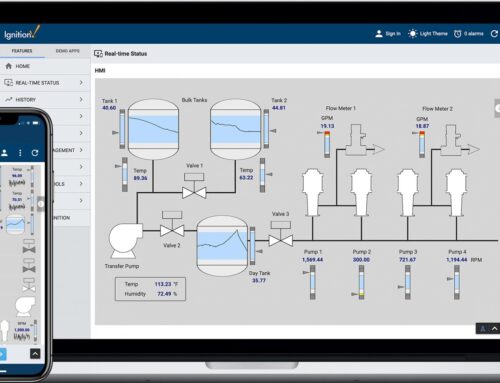In the highly competitive automotive sector,maintaining superior quality while simultaneously reducing production costs is paramount. One critical aspect that directly influences both quality and cost is warranty risk management.With the increasing complexity of automotive components and systems,safeguarding against warranty claims has never been more challenging. However,the advent of refined data solutions,like Ignition by Inductive Automation,offers a transformative approach to mitigating these risks through enhanced process data visibility and control.
This article delves into how leveraging Ignition’s robust capabilities can considerably reduce warranty risks by improving process transparency and precision. By harnessing this powerful tool, automotive manufacturers can tap into comprehensive, real-time data analytics that fortify production integrity and bolster product reliability.
Key Points Explored:
- Comprehensive Data Collection: Ignition enables the aggregation of vast amounts of process data from disparate systems, ensuring a holistic view of all production lines and minimizing information silos.
- Real-Time Monitoring and Response: With real-time insights, automotive plants can instantly detect deviations from process standards, enabling swift corrective actions that preclude defects from escalating into costly warranty claims.
- Traceability Enhancement: By digitizing traceability, Ignition facilitates the tracking of every component through each stage of production—right from raw materials to finished vehicles—ensuring accountability and pinpointing root cause issues effectively.
- Case Study: A renowned global car manufacturer deployed Ignition across its assembly lines, resulting in a 30% reduction in process deviations and subsequently decreasing warranty claim rates by 20%.
- Scalability and Adaptability: Ignition’s architecture allows seamless integration and scalability across various platforms and devices, providing adaptable solutions tailored to the dynamic needs of the automotive industry.
In the subsequent sections, we will delve deeper into each of these points, offering detailed insights and practical advice on how to implement Ignition effectively to fortify your manufacturing processes against warranty risks. Through this insightful exploration, automotive manufacturers will be better equipped to navigate the intricate landscape of quality assurance in today’s high-stakes market.
Enhancing Process Visibility through Real-Time Data acquisition and Analysis
In the fiercely competitive automotive industry, where even a single recall can tarnish a brand’s reputation, the acquisition and analysis of real-time data play a pivotal role. Utilizing Ignition by Inductive Automation, manufacturers can seamlessly aggregate data from various PLCs and sensors onto a centralized platform, allowing for immediate insights into the production landscape. Real-time data acquisition empowers operators with the ability to not only monitor current operations but also to anticipate potential issues before they lead to larger disruptions. As an example, by harnessing data analytics, automotive manufacturers have identified patterns in assembly lines that correlate with increased defects, enabling predictive maintenance that minimizes equipment downtime.
Submission of this real-time visibility extends beyond mere operational metrics. Consider how leading manufacturers have leveraged this technology to reduce warranty risks. By analyzing live data streams, they can establish traceability across the production cycle, ensuring that every component is tracked from assembly through delivery. This visibility aids in swiftly tracing and rectifying defects, curbing potential warranty claims. Moreover, with the capability to set alerts and visualize KPIs like temperature fluctuations, vibration levels, and cycle times, operators can make data-driven decisions to correct deviations instantly. Altogether, these enhancements foster a culture of proactive maintenance and allow for continuous process improvement—hallmarks of a resilient and competitive enterprise. With Ignition’s flexibility, these insights become accessible not just to floor operators but also to engineers and decision-makers across the globe, supported by a web-based interface that ensures seamless integration and ease of expansion.
Leveraging Ignitions MES Module for Comprehensive Traceability and Warranty Risk Mitigation
In the fast-paced automotive industry, managing warranty costs and maintaining product quality are of paramount importance. With Ignition’s MES module, achieving comprehensive traceability becomes not just a possibility but a reality. This module acts as a digital backbone by capturing detailed process data across production lines, ensuring every component and assembly step is thoroughly documented. For instance, consider the application in a high-volume automotive plant where multiple parts are sourced from various suppliers.Using Ignition’s MES, each part can be tagged with a unique ID, allowing manufacturers to track its journey through assembly, from raw material reception to final vehicle assembly. Should a defect arise, engineers can quickly isolate the issue to specific batches or shifts, substantially reducing warranty risks by addressing problems swiftly and preventing mass recalls.
The implementation of comprehensive traceability through Ignition’s MES module allows real-time monitoring and alerts, thus enhancing operators’ response times to anomalies. Imagine an assembly plant producing electric vehicle batteries where every production step is meticulous and high-stakes. here, Ignition’s MES can notify engineers of deviations in critical parameters such as temperature or electrode alignment, triggering corrective protocols before deviations compromise product integrity. Benefits include:
- Enhanced Warranty Protection: By tracing issues back to their root cause,needless warranty claims are minimized.
- Quality Assurance Improvement: Continuously monitor production quality, ensuring ongoing compliance with industrial standards.
- Process Optimization: Enable data-driven decisions to refine production processes.
- Regulatory Compliance: Maintain thorough documentation for audits and certifications.
Tailoring Ignitions Customizable Dashboards to Track and Improve Critical Product Metrics
In refining the production landscape,Ignition’s customizable dashboards offer automotive manufacturers a powerful toolset to visualize and enhance critical product metrics efficiently. With real-time data flowing from various sensors and PLCs,these dashboards serve as a single pane of glass to monitor performance standards and operational thresholds across production lines. As an example, an automaker can create a dashboard that aggregates data on engine temperature, RPM, and emissions levels, ensuring compliance and enhancing predictive maintenance.These dashboards allow operators to swiftly identify deviations from expected performance, providing instant visibility into issues before they escalate into defects that could affect warranty claims.
Customization is key in aligning dashboards with specific production needs and objectives. With Ignition,manufacturers can configure dashboards to display KPIs crucial for decision-making and process optimization. Key metrics such as First Time Through (FTT), Overall Equipment Effectiveness (OEE), and Mean Time Between Failures (MTBF) can be tracked seamlessly. Implementations in facilities producing gearboxes have shown remarkable improvements, where dashboards track vibration and temperature data to predict failure modes. By leveraging such insights, teams can swiftly act on potential risks, ultimately reducing warranty risks and enhancing product quality. Ignition’s powerful scripting and seamless database connectivity enable operators to set up automated alerts and tailored reports, ensuring they have the most relevant information at their fingertips.
Implementing Advanced Analytics and Predictive Maintenance to preempt Warranty Issues
Today’s automotive manufacturing facilities are awash with data, yet frequently enough, this data exists in silos, disconnected from actionable insights that could significantly impact warranty outcomes. Ignition serves as a formidable platform that aggregates data from disparate sources–ranging from machine sensors to production line PLCs–into a central repository. Through advanced analytics, this data can be leveraged to develop predictive maintenance strategies that pinpoint potential equipment failures before they manifest into bigger problems. For instance, a major automaker utilized Ignition to identify anomalous vibration patterns in its paint shop conveyor systems. By analyzing this data in real-time, the team was able to preemptively repair mechanical issues, reducing the incidence of defects that would later become warranty claims.
The success of such predictive maintenance initiatives hinges on robust process data, and Ignition seamlessly integrates with MES systems to fortify this need. This integrated approach enables automotive manufacturers to track the entire life cycle of each part with precision, from assembly line to end-user. Such as, an electronics assembly unit with standard Ignition-MES integration was able to track real-time data about soldering temperatures in its ECU (Engine Control Unit) production line. Any deviations from optimal temperature ranges were logged and analyzed, which allowed the team to quickly adjust the process to prevent faulty ECUs from reaching the market. By customizing alerts and dashboards, stakeholders gain immediate insights into process efficiency and quality control measures.All of these capabilities work together to minimize warranty issues while simultaneously maximizing Overall Equipment Effectiveness (OEE), propelling automotive operations toward manufacturing excellence.
In Summary
reducing warranty risk is a pivotal challenge for the automotive sector that can be effectively addressed through better process data management using Ignition. By harnessing the robust capabilities of Ignition, automotive manufacturers can achieve unparalleled visibility and control over production processes, thus driving down the likelihood of warranty issues. Key takeaways from this discussion include:
- Enhanced Data Collection: Implementing Ignition allows for real-time data acquisition,enabling proactive identification of potential defects.
- Improved Traceability: With comprehensive process data, manufacturers can trace quality issues back to their source, facilitating rapid problem resolution.
- Informed Decision-Making: Access to detailed, historical process data empowers manufacturers to make data-driven adjustments that enhance product reliability.
These strategies not only mitigate warranty risks but also elevate overall operational efficiency and product quality. We invite you to explore tailored solutions with Innorobix, a leader in SCADA integration and MES systems for the automotive industry. For more information or to request a consultation/demo,contact our team today and discover how we can definitely help optimize your manufacturing processes with cutting-edge technologies.
















